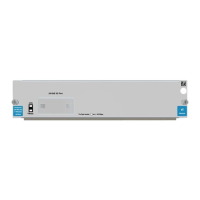Dynamic SQL Operations
HP NonStop SQL/MP Programming Manual for C—429847-008
10-40
Basic Dynamic SQL Program
62 /* Declare error handling function: */
63 void sql_err()
64 {
65 SQLCADISPLAY ((int *) &sqlca);
66 }
67
68 /* ------------------------------------------------------- */
69
70 /* Declare WHENEVER clause for error checking: */
71 exec sql WHENEVER SQLERROR CALL :sql_err;
72
73 /* ------------------------------------------------------- */
74 void blank_pad(char *buf, size_t size)
75 /* */
76 /* For blank padding character strings to send to SQL */
77 /* */
78
79 {
80 size_t i;
81
82 i = strlen(buf);
83 if (i < size)
84 memset(&buf[i], ' ', size - i);
85 }
86
87 /* ------------------------------------------------------- */
88
89 EXEC SQL BEGIN DECLARE SECTION;
90 void process_and_execute ( char *cmd )
91 {
92 char (*prep_cmd)[ MAXCMD ];
93 /* SQL requires array of char, but we are passing in a */
94 /* pointer to char. We therefore create a pointer to */
95 /* array of char for use by SQL. */
96
97 EXEC SQL END DECLARE SECTION;
98
99 blank_pad (cmd, MAXCMD);
100
101 prep_cmd = cmd;
102
103 exec sql PREPARE dyncmd FROM :*prep_cmd;
104
105 strncpy (osqlda.eye_catcher,SQLDA_EYE_CATCHER, 2);
106
107 osqlda.num_entries = 1;
108
109 /* Initialize ind_ptr to NULL.You must always initialize */
110 /* this field, even when the program is not handling null */
111 /* values. */
112 osqlda.sqlvar[0].ind_ptr = NULL;
113
114 exec sql DESCRIBE dyncmd INTO :osqlda;
115
116 /* SQL tells you what it has to work with; you then */
117 /* communicate what your variable is like to SQL; you */
118 /* might want to look at the data_type field and adjust */
119 /* Here, we're just putting it into a LONG and ignoring */
120 /* scale. */
121
Example 10-7. Basic Dynamic SQL Program (page 2 of 4)
